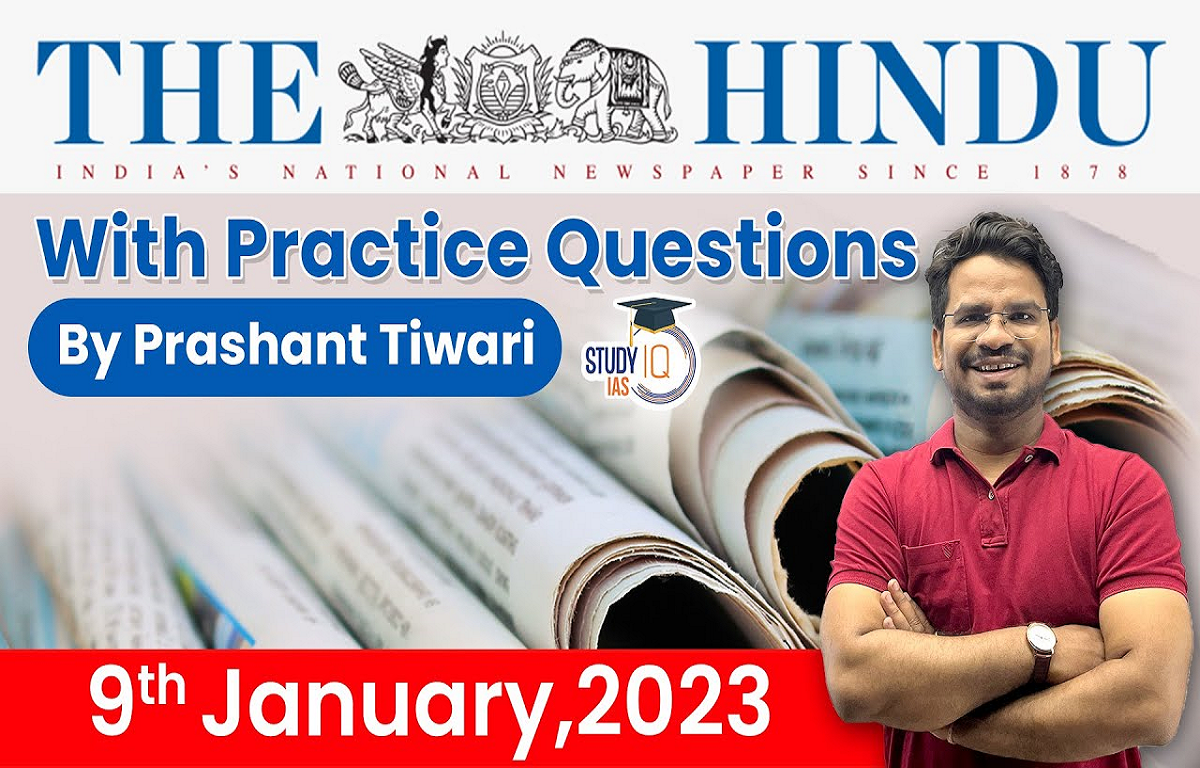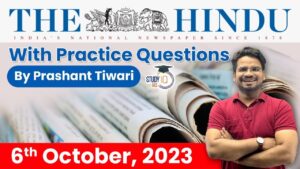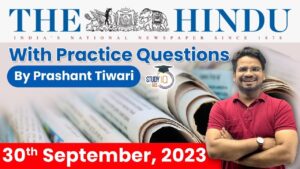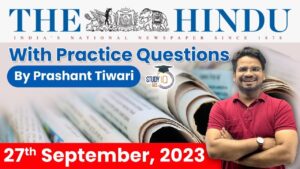The Hindu Newspaper Analysis for UPSC

The Hindu Newspaper Analysis 7 January 2023
- Recently, this newspaper reported that the freezing of administrative boundaries that precedes the Census would be done with effect from July 1, 2023. Such a freezing is necessary as State governments are in the habit of creating new districts and tehsils or reorganising existing ones.
- There is no official statement yet about when the Census would be conducted.
- The Constitution talks about the use of Census data for delimitation of constituencies and for determining the quantum of reservation for Scheduled Castes and Scheduled Tribes. However, it does not say what should be the periodicity of the census. The Census Act, 1948, which predates the Constitution, provides the legal background for several activities relating to the Census without mentioning anything about its periodicity.
- This is unlike the position in several countries such as the U.S. and Japan where the Constitution or the Census law mandates a Census with defined periodicity.
The Hindu Editorial Today
- The Census alone can provide population data for every village and town in the country.
- We have population projections at the State and national level that have been fairly accurate in the past. However, it is not feasible to get reliable projections at lower geographic levels such as for districts and cities or even small States and Union Territories.
- The Census data are used to determine the number of seats to be reserved for SCs and STs in Parliament, State legislatures, local bodies, and government services. In case of panchayats and municipal bodies, reservation of seats for SCs and STs is based on their proportion in the population.
- The rural-urban distribution of population has been rapidly changing over the years. There is high population growth in the urban areas.
- The pandemic resulted in deaths among adults and the aged relatively more than children. Its impact on age distribution in severely affected areas would be of interest as it would give an indirect estimates of the number of deaths.
- National Population Register:
NPR is a database containing a list of all usual residents of the country. Its objective is to have a comprehensive identity database of people residing in the country.- A usual resident for the purposes of NPR is a person who has resided in a place for six months or more, and intends to reside there for another six months or more.
- The NPR was first collected in 2010 and then updated in 2015.
- It is generated through house-to-house enumeration during the “house-listing” phase of the census, which is held once in 10 years.
- NPR vs Census:
- Objective:
- The census involves a detailed questionnaire – there were 29 items to be filled up in the 2011 census – aimed at eliciting the particulars of every person, including age, sex, marital status, children, occupation, birthplace, mother tongue, religion, disability and whether they belonged to any Scheduled Caste or Scheduled Tribe.
- On the other hand, the NPR collects basic demographic data.
- Legal Basis:
- The census is legally backed by the Census Act, 1948.
- The NPR is a mechanism outlined in a set of rules framed under the Citizenship Act, 1955.
- Objective:

- The Supreme Court’s timely intervention has halted the forcible eviction of some 50,000 people from Haldwani in Uttarakhand, where the occupants are accused of squatting on railway property for decades. The Uttarakhand High Court had taken a tough stand against the residents, and passed a slew of directions that would have entailed their eviction within a week, backed by force, including the deployment of paramilitary forces.
- In an earlier round of litigation over the same land, which adjoins the Haldwani Railway Station, court orders had allowed proceedings against individual occupants under the Public Premises (Eviction of Unauthorised Occupants) Act, 1971, to be completed.
- A shortage of housing, as well as inadequate recognition of the right to shelter, means that large masses of people encroach on vacant land, be it on the bed of water bodies or government property.
- India does not have a good record on rehabilitation of those evicted from public spaces, and this case presents an opportunity to the Supreme Court to lay down the law on meaningful rehabilitation as well as effective prevention of encroachments.

- Come Pongal and many parts of Tamil Nadu are alive with preparations for jallikattu, a traditional sport involving bulls. On December 8, a five-member Constitution Bench of the Supreme Court reserved its verdict on a batch of pleas challenging the Tamil Nadu law allowing jallikattu.
- It is likely to rule on the validity of the Prevention of Cruelty to Animals (Tamil Nadu Amendment) Act, 2017, which does not talk of the “taming of bulls” while giving legal sanction to jallikattu.
- As the court had declared void the Tamil Nadu Regulation of Jallikattu Act, 2009, which referred to the “taming of bulls”, the framers of the 2017 law defined jallikattu as “an event involving bulls conducted with a view to follow tradition and culture”.
- whether jallikattu should be granted constitutional protection as a collective cultural right under Article 29 (1); and whether the 2017 law and rules “perpetuate cruelty to animals” or were a means to ensure “the survival and well-being of the native breeds of bulls”.
- Cruelty to Animals Act, 1960

- The 2017-18 National NCD monitoring survey reported that 98% of Indians do not take adequate fruits and vegetables and only 59% of adults do adequate physical activity.
- Often the reason given is that people do not pay enough importance to health and choose to eat unhealthy due to taste and cost considerations or are simply too lazy to take that walk or go to the gym. In other words, individuals fail in making the right choices and are at fault.
- We know that food choices in families are now driven by children who are heavily influenced by food marketing on television or by inducements like toys. Surveys have shown that unhealthier choices are available more, priced lower and displayed more prominently in grocery stores to promote their buying.
- However, we do not do it as we have many barriers to walking in our environment—air pollution, weather (hot-cold-rains), unusable footpaths, lack of parks or, when available, often unsafe and poorly lit. Socio-cultural barriers are equally important, especially for women not being able to do physical activity—their role within the house.
- The regulatory approach is best exemplified by regulating the marketing of foods to children. Many countries have banned or restricted the advertising of food and beverages to children on television—food companies cannot advertise on children’s channels or at times when they watch television. Regulating salt content in butter, cheese, chips etc. is another area for regulation. India is currently exploring front—of—pack food labelling by self—regulation by industry. Self–regulation has not really worked globally and is just a delaying tactic by the industry.
- Given that affordability is an important consideration for eating healthy, fiscal measures have an important role. Some examples are taxing junk food, incentivising healthier options and subsiding fruits and vegetables.
- Laying more footpaths, making them walkable by having them low, keeping them clean, removing obstructions and maintaining parks etc. are doable interventions by municipalities.


- In five States — West Bengal, Andhra Pradesh, Uttarakhand, Goa and Tripura — more than 8% of men aged below 35 had a random blood glucose level higher than 140 milligrams per decilitre (mg/dl), according to the National Family Health Survey-5 conducted between 2019 and 2021. The trend holds true for women aged below 35 in West Bengal and Tripura as well.
- In 20 out of the 29 States analysed, the share of such young men increased. Of the nine States where the share decreased, Kerala’s decline was notable. From 8.8% young men with high blood glucose level in 2015-16, the share reduced to 3.9% in 2019-21. Among women, an increase was observed in 21 States.

- When Mumbai-based Shalini (name changed) walked into the State-run J.J. Hospital in December last year seeking an abortion, she was turned away. Doctors at the hospital decided that her case was legally complicated. Her pregnancy had crossed 20 weeks, she was unmarried and the reason for her pregnancy was determined “as due to failure of contraception”.
- Despite the fact that in September last year, a three-judge Bench of the Supreme Court passed a judgment that unmarried women too can terminate their pregnancy until 24 weeks, the situation on the ground remains dismal.
- Section 3B of Rules prescribed under the MTP Act: It allows seven categories of women who shall be considered eligible for termination of pregnancy up to twenty-four weeks, e.g. rape survivors, minors, change of marital status (from married to divorced), etc.
- However, the law doesn’t recognize the situation of unmarried women.
- Law covered ‘unmarried’ women: An amendment to the Act in 2021 had substituted the term ‘husband’ with ‘partner’, a clear signal that the law covered unmarried women within its ambit. Thus, SC allowed women to have an abortion.
- Denying an unmarried woman the right to a safe abortion violates her personal autonomy and freedom. A woman’s right to reproductive choice is an inseparable part of her personal liberty under Article 21 of the Constitution. She has a sacrosanct right to bodily integrity.


- Pravasi Bharatiya Divas (PBD) is celebrated on 9thJanuary every year to mark the contribution of the Overseas Indian community in the development of India.
- 9th January was chosen as the day to celebrate PBD since it was on this day in 1915 that Mahatma Gandhi, the greatest Pravasi, returned to India from South Africa, led India’s freedom struggle and changed the lives of Indians forever.
- This day came into effect in 2003, but in 2015 it was revised and was decided to be celebrated every two years. It was then a theme-based conference that was set up every year during the interim period.
- PBD Conventions are held once every two years.
Q) Exercise ‘Veer Guardian-2023’ is between India and:
- Japan
- S.A
- K
- China
अभ्यास ‘वीर गार्जियन-2023’ भारत और के बीच है:
- जापान
- यू.एस.ए
- यू.के
- चीन
Explanation :
India and Japan are all set to hold the joint Air Exercise, ‘Veer Guardian-2023’ involving the Indian Air Force and Japan Air Self Defence Force (JASDF) at Hyakuri Air Base, Japan from 12th of January.
- The Joint Exercise which will continue till 26th January aims at promoting Air Defence cooperation between the countries.
- The Indian contingent participating in the air exercise will include four Su-30 MKI, two C-17 and one IL-78 aircraft, while the JASDF will be participating with four F-2 and four F-15 aircraft.
- It will include the conduct of various aerial combat drills between the two Air Forces.
- They will undertake multi-domain air combat missions in a complex environment and will exchange best practices.
- Exercise ‘Veer Guardian’ will fortify the long-standing bond of friendship and enhance the avenues of defence cooperation between the two Air Forces.
Q) With reference to the Meghalaya’s Living Root Bridge, consider the following statements:
- Meghalaya is known for its living root bridges, locally known as jingkieng jri.
- They are on the UNESCO’s World Heritage sites.
Which of the above statements is/are correct?
- 1 only
- 2 only
- Both 1 and 2
- Neither 1 nor 2
मेघालय के लिविंग रूट ब्रिज के संदर्भ में निम्नलिखित कथनों पर विचार कीजिये:
- मेघालय अपने जीवित मूल पुलों के लिए जाना जाता है, जिसे स्थानीय रूप से जिंगकिएंग जरी के नाम से जाना जाता है।
- वे यूनेस्को की विश्व धरोहर स्थलों पर हैं।
उपरोक्त कथनों में से कौन-सा/से सही है/हैं?
- केवल 1
- केवल 2
- 1 और 2 दोनों
- न तो 1 और न ही 2
Explanation :
A farmer recently takes forward the State’s traditional practice of building root bridges and connects two areas across Umkar river in Cherrapunjee.
- Meghalaya is known for its living root bridges, locally known as jingkieng jri.
- They are on the tentative list of UNESCO’s World Heritage sites.
- Many bridges across the State are over a century old.
- A living root bridge is like a suspension bridge formed by guiding the pliable roots of the rubber fig tree (Ficus elastica) across a stream or river and allowing the roots to grow and strengthen over time.
- They are common in the southern part of the Northeast Indian state of Meghalaya.
Q) With reference to the Pravasi Bharatiya Diwas, consider the following statements:
- It is held once every two years.
- The theme of Pravasi Bharatiya Diwas 2023 is Diaspora: Reliable partners for India’s progress in Amrit Kaal.
Which of the above statements is/are correct?
- 1 only
- 2 only
- Both 1 and 2
- Neither 1 nor 2
प्रवासी भारतीय दिवस के संदर्भ में निम्नलिखित कथनों पर विचार कीजिये:
- यह हर दो साल में एक बार आयोजित किया जाता है।
- प्रवासी भारतीय दिवस 2023 की थीम प्रवासी: अमृत काल में भारत की प्रगति के लिए विश्वसनीय भागीदार है।
उपरोक्त कथनों में से कौन-सा/से सही है/हैं?
- केवल 1
- केवल 2
- 1 और 2 दोनों
- न तो 1 और न ही 2
Explanation :
- Recently, Prime Minister’s Office said in a statement that the 17th Pravasi Bharatiya Divas (PBD) will be held on January 9, 2023, in Indore, Madhya Pradesh.
- Pravasi Bharatiya Divas (PBD) Convention is the flagship event of the Government of India. It provides an important platform to engage and connect with overseas Indians and to enable the diaspora to interact with each other.
- The theme of 2023 PBD? Diaspora: Reliable partners for India’s progress in Amrit Kaal.
Q) With reference to the United Nations Peacekeeping Mission, consider the following statements:
- The UN Peacekeepers are known as Blue Helmets.
- India has never sent any military troops to the U.N. peacekeeping missions.
Which of the above statements is/are correct?
- 1 only
- 2 only
- Both 1 and 2
- Neither 1 nor 2
संयुक्त राष्ट्र शांति मिशन के संदर्भ में निम्नलिखित कथनों पर विचार कीजिये:
- संयुक्त राष्ट्र के शांति सैनिकों को ब्लू हेलमेट के रूप में जाना जाता है।
- भारत ने कभी भी संयुक्त राष्ट्र के शांति अभियानों में कोई सैन्य टुकड़ी नहीं भेजी।
उपरोक्त कथनों में से कौन-सा/से सही है/हैं?
- केवल 1
- केवल 2
- 1 और 2 दोनों
- न तो 1 और न ही 2
What is United Nations Peacekeeping Mission?
- This Peacekeeping operation is policing and peacebuilding actions carried out by the UN to bring order and stability to war-torn nations.
- The UN Peacekeepers are known as ‘Blue Helmets’ or ‘Blue Berets’.
- Peacekeepers are the military personnel of the UN that work alongside the UN Police and civilian colleagues to promote “stability, security, and peace processes”.
- Origin: When the UN Security Council approved the deployment of UN military observers to the Middle East in 1948, the UN Peacekeeping Forces were established.
- Nodal Agency: The United Nations Charter authorises the United Nations Security Council to take collective action to maintain international peace and security.
- Structure: The UN Peacekeeping force is supplemented by personnel from member nations. They are added to the force on a volunteer basis.
- India’s role: India is one of the largest troop-contributing nations to the U.N. peacekeeping missions. India is the second-highest military and fifth-highest police contributing country to the United Nations Organization Stabilization Mission in the Democratic Republic of the Congo (MONUSCO).
Mains Practice Question:
Q) “A man is but the product of his thoughts. What he thinks he becomes.” — M.K. Gandhi (150 words)
“एक आदमी अपने विचारों का उत्पाद है। वह जो सोचता है वह बन जाता है। — एम.के. गांधी (150 शब्द)


 The Hindu Newspaper Analysis 6 October 2...
The Hindu Newspaper Analysis 6 October 2...
 The Hindu Newspaper Analysis 30 Septembe...
The Hindu Newspaper Analysis 30 Septembe...
 The Hindu Newspaper Analysis 27 Septembe...
The Hindu Newspaper Analysis 27 Septembe...





















